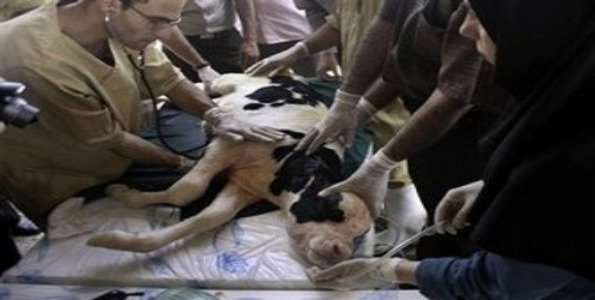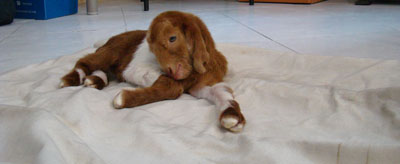Iranian development in the field of genetic cloning continues to gallop forward with the cloning of the first calf, after a sheep and a goat had already been cloned

On Saturday, July 11, 2009, Iran's first cloned calf was born. The calf, named "Bonyana", was born by caesarean section at the Royan Institute in Spain at the end of 270 days of pregnancy. According to the researchers, this was the most critical step in animal cloning research, which was ultimately intended to provide the ability to produce advanced medicines.
Bonina was born at the end of a long process which included the creation of 2000 cloned embryos with which 100 cows were crossed over the course of two years. The pregnancy rate was high at the beginning, but at the end of the first three months, most cows miscarried and only 5 cases continued until the sixth month. Out of 5 cows, 3 more miscarried at later stages, one cow gave birth to "Bonina" and another cow in advanced stages of pregnancy - the institute's researchers hope to announce the birth of the second calf in the coming days.

Iran is the most advanced country in the Middle East in animal cloning and one of the leading countries in this field in the world. The development of technology for animal cloning has been in the hands of the Iranians for several years, and the Royan Institute researchers have already demonstrated their ability in this field several times - on April 15 of this year, the researchers announced Goat clone And on September 30, 2006, a sheep was cloned.
The institute's high success rates in animal cloning can be compared to advanced countries in this field such as New Zealand, Denmark and the USA. Iran was the first country in the Middle East to clone a sheep and a goat, and today it became the first in the region to successfully clone a cow as well. The Iranian success in this field is due to a political-religious approach of the Iranian Shiite movement that allows the cloning of animals but prohibits the cloning of humans. On the other hand, the Sunni stream, especially in Saudi Arabia, completely prohibits cloning of any kind.
As mentioned, this was an essential step in a long-term process for the production of advanced medicines from cloned animals. The cloned goat "Hannah" that was born about three months ago contained a unique genetic code that produces t-PA. The great importance of cow cloning stems from the fact that cows can produce milk containing different ingredients. Beyond the commercial possibilities, the researchers announced their readiness to harness the technology to save animal species in danger of extinction.

5 תגובות
It's not really related to photoshop.. they can take some goat and say it's cloned..
Tam asked (maybe?),
Is there any way to verify their postings?
Or do we just "trust" them?
Since history in the field paints a very problematic picture of reliability.
As for Iran, whose credibility is mainly found in Photoshop...
Let them deal with clones, not an atom that is convenient for the whole world from the powerhouse of Shiite science
Shmulik,
If we put the humor aside for a moment, the sheep and the goat that were cloned in the past are still alive.
What does it matter, after all the cloned calf will die anyway from the acid rain that will fall on Iran, after it is given in the head...